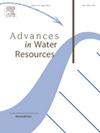The rigorous upscaling of advection-dominated transport in heterogeneous porous media via the Method of Finite Averages
IF 4.2
2区 环境科学与生态学
Q1 WATER RESOURCES
引用次数: 0
Abstract
Systems involving advection-dominated transport through heterogeneous porous and fractured media are ubiquitous in subsurface engineering applications. However, upscaling such systems continues to challenge rigorous modeling efforts, particularly when advection is stronger than diffusion at fine spatial scales (i.e., when the Péclet number is greater than one at length scales that characterize a system’s unit-cells, representative elementary volumes, or averaging regions). In this work, we propose and validate a strategy for extending the Method of Finite Averages (MoFA), a rigorous upscaling methodology for heterogeneous porous media, to upscale transport systems experiencing stronger advection than diffusion at fine scales (i.e., fine-scale Péclet numbers greater than one). We detail the strategy, the physical conditions under which it can be applied while retaining a priori modeling error guarantees, and implement the strategy to obtain a MoFA model for advective-diffusive transport that accommodates advective physics at fine spatial scales. We then perform two numerical experiments considering systems with system-scale Péclet numbers of 300 and 1000 — which correspond to fine-scale Péclet numbers of 30 and 100, respectively — to verify that the error guarantees are met under the strategy. After, we conduct a numerical study to demonstrate the strategy’s advantages over the original MoFA methodology. The results suggest that rigorously-upscaled transport models for heterogeneous porous media experiencing advective physics at finer spatial scales can be derived through MoFA and resolved orders of magnitude faster than their pore-scale counterparts. The results also suggest that the presented strategy is limited to modeling shallow concentration gradients when there are large differences between the time scales related to advection and a system’s temporally-varying boundary conditions. This limitation hinders the strategy’s practicality in modeling more advective systems, and as such, opportunity exists for developing additional strategies that accommodate rapidly-varying boundary conditions — and consequentially, steeper concentration gradients — while modeling advective systems with MoFA.
用有限平均法对非均质多孔介质中平流主导输运的严格升级
在地下工程应用中,以平流为主的非均质多孔和裂缝介质输运系统是普遍存在的。然而,升级这样的系统继续挑战严格的建模工作,特别是当平流在精细空间尺度上强于扩散时(即,当psamclet数在表征系统的单元格、代表性基本体积或平均区域的长度尺度上大于1时)。在这项工作中,我们提出并验证了一种扩展有限平均法(MoFA)的策略,这是一种严格的非均质多孔介质升级方法,用于在精细尺度(即精细尺度psamclet数大于1)上经历更强平流而不是扩散的高档运输系统。我们详细介绍了该策略,在保留先验建模误差保证的情况下可以应用该策略的物理条件,并实施了该策略,以获得在精细空间尺度上适应平流物理的对流扩散输运的MoFA模型。然后,我们进行了两个数值实验,考虑系统尺度psamclet数为300和1000的系统(分别对应于精细尺度psamclet数为30和100),以验证在该策略下满足误差保证。之后,我们进行了数值研究,以证明该策略优于原始MoFA方法。结果表明,在更精细的空间尺度上,通过MoFA可以推导出具有平流物理的非均质多孔介质的严格上尺度输运模型,并且比孔隙尺度的输运模型更快地分辨出数量级。结果还表明,当与平流相关的时间尺度与系统随时间变化的边界条件之间存在较大差异时,所提出的策略仅限于模拟浅层浓度梯度。这一限制阻碍了该策略在模拟更多平流系统中的实用性,因此,在用MoFA模拟平流系统时,存在开发适应快速变化的边界条件(以及随之而来的更陡峭的浓度梯度)的其他策略的机会。
本文章由计算机程序翻译,如有差异,请以英文原文为准。
求助全文
约1分钟内获得全文
求助全文
来源期刊

Advances in Water Resources
环境科学-水资源
CiteScore
9.40
自引率
6.40%
发文量
171
审稿时长
36 days
期刊介绍:
Advances in Water Resources provides a forum for the presentation of fundamental scientific advances in the understanding of water resources systems. The scope of Advances in Water Resources includes any combination of theoretical, computational, and experimental approaches used to advance fundamental understanding of surface or subsurface water resources systems or the interaction of these systems with the atmosphere, geosphere, biosphere, and human societies. Manuscripts involving case studies that do not attempt to reach broader conclusions, research on engineering design, applied hydraulics, or water quality and treatment, as well as applications of existing knowledge that do not advance fundamental understanding of hydrological processes, are not appropriate for Advances in Water Resources.
Examples of appropriate topical areas that will be considered include the following:
• Surface and subsurface hydrology
• Hydrometeorology
• Environmental fluid dynamics
• Ecohydrology and ecohydrodynamics
• Multiphase transport phenomena in porous media
• Fluid flow and species transport and reaction processes
 求助内容:
求助内容: 应助结果提醒方式:
应助结果提醒方式:


